Black History Month Events and Resources
.jpg)
Black History Month is an annual celebration of achievements by African Americans and a time for recognizing their central role in U.S. history. Also known as African American History Month, the event grew out of “Negro History Week,” the brainchild of noted historian Carter G. Woodson and other prominent African Americans. Since 1976, every U.S. president has officially designated the month of February as Black History Month. Other countries around the world, including Canada and the United Kingdom, also devote a month to celebrating Black history.
A history of Black History Month
https://www.history.com/topics/black-history/black-history-month
Great Public TV Shows to watch:
PBS Black History Month Documentaries for February 2025
https://www.pbs.org/articles/what-to-watch-black-history-month
KCTS Cascade PBS
Pierce County's Black History
Back2Besa Fox 13 - This show is all about celebrating, and encouraging people to visit Black owned Businesses
Great Migrations Dr. Henry Louis Gates
https://video.cascadepbs.org/show/great-migrations-a-people-on-the-move/episodes
Black History Luncheon at People’s Community Center
• Saturday February 1st, 1:00pm – 4:00pm
• Free but RSVP Here
We the People and the American Dream
• Where: WA State History Museum 1911 Pacific Avenue, Tacoma, WA 98402
• When: Feb. 20th 5:30pm-8:00pm
• FREE with registration
Black History Month Soirée
• Where: Bainbridge Island Museum of Art 550 Winslow Way East Bainbridge Island, WA 98110
• When: Feb. 22nd 6:00pm-10:00pm
• Free but RSVP Here
Articles and Resources
• Forbes Black History
• Millennial in Debt
• African-American-History
• The 2024 DEI Outlook
• Outside Online
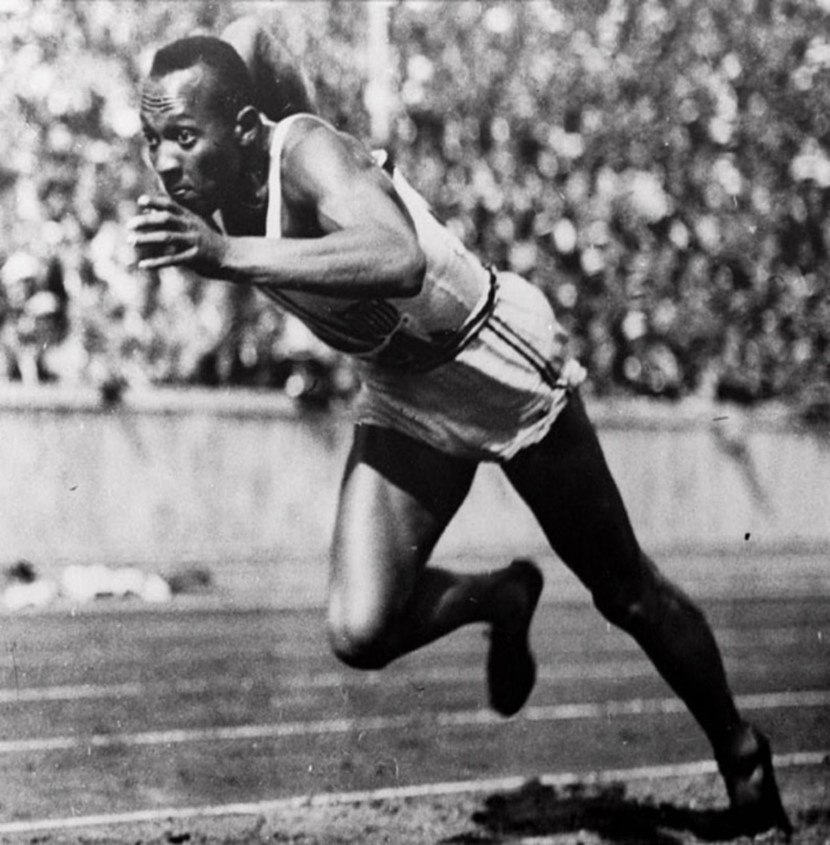
Jesse Owens: The Unstoppable Athlete
Jesse Owens was a legendary track and field athlete who triumphed over discrimination. At the 1936 Berlin Olympics, he won four gold medals in the long jump, 100m, 200m, and 4x100m relay, defying Hitler's ideology and showcasing the capabilities of black athletes. He was the first American track and field athlete to win four gold medals at a single Olympic Games. Owens set multiple world records, including three in 45 minutes at the 1935 Big Ten Championships. His achievements went beyond sports. He symbolized what was possible, he broke down barriers, and he contributed to civil rights issues and the right for equality throughout the world. While he died on March 31, 1980, Jesse Owens’ courage, accomplishments, and legacy live on forever.
Source: https://jesseowens.com/
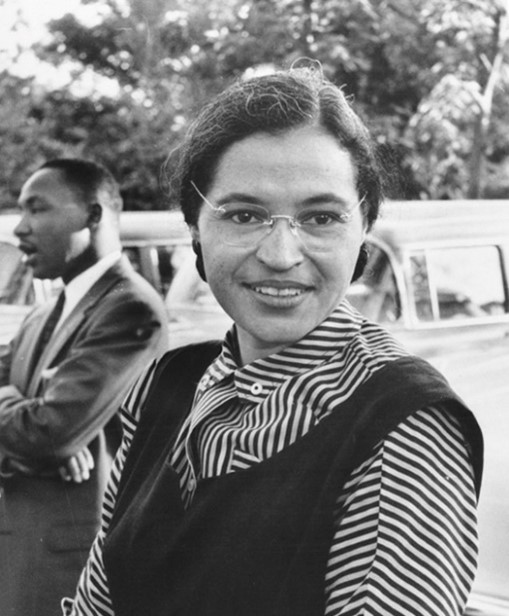
Rosa Louise McCauley Parks (February 4, 1913 – October 24, 2005) was an American activist in the civil rights movement, best known for her pivotal role in the Montgomery bus boycott. The United States Congress has honored her as "the first lady of civil rights" and "the mother of the freedom movement".[1]
Parks’ act of defiance and the Montgomery bus boycott became important symbols of the movement. She became an international icon of resistance to racial segregation, and organized and collaborated with civil rights leaders, including Edgar Nixon and Martin Luther King Jr. At the time, Parks was employed as a seamstress at a local department store and was secretary of the Montgomery chapter of the NAACP. She had recently attended the Highlander Folk School, a Tennessee center for training activists for workers' rights and racial equality. Although widely honored in later years, she also suffered for her act; she was fired from her job and received death threats for years afterwards.[5] Shortly after the boycott, she moved to Detroit, where she briefly found similar work.
Learn more at: https://en.wikipedia.org/wiki/Rosa_Parks
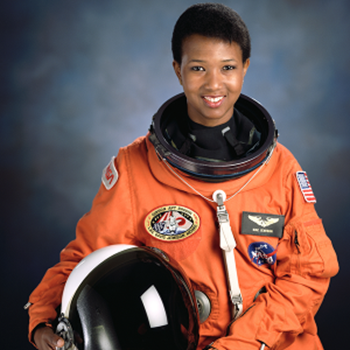
Born in 1956, Mae Jemison received degrees in Chemical Engineering and African American Studies and went on to become a medical doctor and officer in the Peace Corps. In 1983, after watching Sally Ride, Jemison decided to apply to the astronaut program at NASA. On September 12, 1992, Jemison went into orbit aboard the space shuttle Endeavour as the first African American woman in space.
Jemison left NASA in 1993, continuing to work for the benefit of others as an educator, entrepreneur, and author. “Sometimes people want to tell you to act or to be a certain way. Sometimes people want to limit you because of their own imaginations” Mae Jemison, "Mae Jemison: Coming In From Outer Space." Ebony, December 1992.
When she was eight years old her mother signed her up for beginner ballet at the Sadie Bruce Dance Academy, which started her life-long love of dance. Jemison also excelled in science during elementary school and created projects focused on the evolution of life on planet Earth. She learned about astronomy while visiting the Adler Planetarium in Chicago and when she entered Morgan Park High School, she investigated sickle cell anemia and won the city-wide science fair. Although younger than most of her peers, she was always on the honor roll and graduated in 1973 when she was 16 years old. She went on to graduate from Stanford University with a BS degree in Chemical Engineering and a BA degree in African American Studies. The next step in her educational journey led her to Cornell Medical School. Jemison graduated from Cornell in 1981 with a Doctorate in Medicine. She spent a summer during medical school in Kenya working for the African Medical Education and Research Foundation and traveled to Egypt, Greece and Israel afterward. These experiences abroad inspired Jemison to join the Peace Corps in 1983 where she served as a medical officer. At the age of 26, she became the Area Peace Corps Medical Officer for Sierra Leone and Liberia.
Back home she was inspired by Sally Ride’s historical 1983 mission as the first woman in space and applied to the astronaut program at NASA. She was accepted in 1987 and was accepted for NASA Astronaut Group 12. On September 12, 1992, Jemison and six other astronauts completed a mission aboard the Space Shuttle Endeavor. With the successful launch, Mae Jemison became the first African American woman in space.
Learn more about Mae Jemison in her book Find Where the Wind Goes: Moments from My Life. New York: Scholastic, 2001.
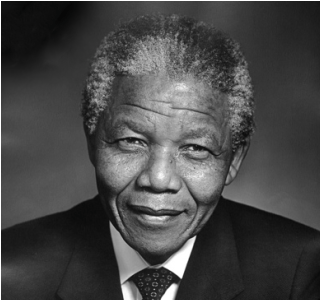
Nelson Mandela was a towering figure in the fight for justice, equality, and human rights. As a leader of the anti-apartheid movement in South Africa, he spent 27 years in prison for his activism, ultimately becoming the country's first Black president in 1994. Mandela's unwavering commitment to peace, reconciliation, and dismantling institutionalized racism has inspired generations worldwide. We can honor his legacy by reflecting on the continued struggle for racial equality and justice. We can stand with Mandela’s vision by advocating for social change, supporting Black communities, challenging systemic racism, and embracing the values of unity, empathy, and equality.
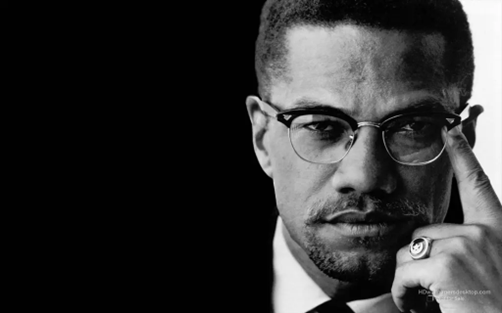
Photo Source: https://dailytheology.org/2015/02/23/islams-beautiful-witness-to-america-malcolm-x/
Malcolm X’s life and work left an indelible mark on the civil rights movement and communities across the U.S., including Tacoma and the Puget Sound region. As a fierce advocate for Black empowerment, he emphasized self-reliance, economic independence, and cultural pride. His early leadership in the Nation of Islam resonated with African American communities facing systemic racism, inspiring local activists to challenge segregation, police brutality, and economic inequality. Malcolm’s message of self-defense and Black pride influenced the rise of Black Power movements, including the Black Panther Party in Seattle, which provided community programs like free breakfasts and health clinics. His teachings also encouraged the growth of Black-owned businesses and the incorporation of African American history into local education, leaving a lasting impact on Tacoma’s social and cultural landscape. Malcolm X’s influence as a Muslim was equally transformative. His introduction of Islam to many African Americans provided a spiritual foundation for empowerment and resistance. After leaving the Nation of Islam and embracing Sunni Islam following his pilgrimage to Mecca, Malcolm’s worldview expanded to promote racial unity and global human rights. This shift inspired diverse communities, including those in the Pacific Northwest, to see Islam as a unifying force beyond racial boundaries. His legacy contributed to the growth of Muslim communities in the region, fostering the establishment of mosques and cultural organizations that emphasized social justice and community service. By reframing the civil rights struggle as part of a global movement, Malcolm connected African American experiences to broader anti-colonial and human rights efforts worldwide.
During Black History Month, Malcolm X’s life serves as a powerful reminder of the multifaceted fight for justice through activism, cultural pride, and spiritual growth. His evolution from a vocal advocate of Black separatism to a champion of global solidarity highlights the complexity of his legacy. In places like Tacoma, where diverse communities continue to grapple with racial and economic disparities, Malcolm’s teachings remain a source of inspiration. His commitment to both local empowerment and global human rights underscores the enduring relevance of his work, reminding us that the pursuit of equality requires both self-determination and collective action.

Maya Angelou's poetry and autobiography powerfully celebrate resilience, identity, and self-love while challenging societal stereotypes about Black/African American people. In works like “Still I Rise” and “Phenomenal Woman,” Angelou asserts her strength, defying oppression and offering a message of empowerment and pride that has broken harmful stereotypes. Her work provided a voice for Black communities to embrace their identity, fostering unity and understanding across racial divides. Through her words, Angelou promoted social justice, equality, and shared human dignity. In I Know Why the Caged Bird Sings, Angelou recounts her childhood in the segregated South, navigating racism, sexual abuse, and her search for identity. The metaphor of the "caged bird" symbolizes societal limitations, while the bird’s song represents hope and survival. The book emphasizes the healing power of literature, capturing Angelou's journey toward self-expression and freedom, solidifying its place as a pivotal work in African American literature.
Previous
Next
.jpg)







